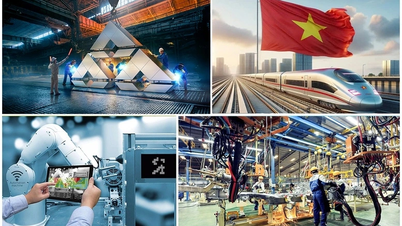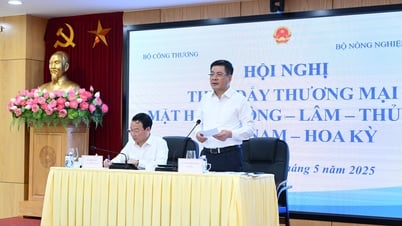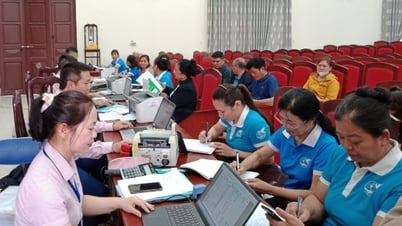 Illustrative photo. (Photo: Hoang Hieu/VNA)
Illustrative photo. (Photo: Hoang Hieu/VNA)
The 4.0 industrial revolution has made the digital technology sector a decisive economic sector for the development of each country. However, besides the great socio-economic benefits, the new generation of digital technology also poses many risks and challenges.
This requires Vietnam to proactively adapt, control risks well, make the most of the world's advanced scientific and technological achievements, gradually become self-reliant in core and strategic technologies, improve competitiveness in the global value chain, and develop the country into a rich and powerful country in the new era - the era of national development.
Opportunities and challenges intertwine
In the context of globalization and the 4.0 industrial revolution, digital technology has been affirming its key driving role, promoting socio-economic development.
According to Ms. Tran Thi Lan Huong, senior digital development specialist of the World Bank in Vietnam, artificial intelligence (AI) - a new technology today is expected to contribute 19.9 trillion USD to the global economy by 2030.
AI can transform new economies with the potential to improve efficiency and productivity, improve public service delivery, develop workforce skills, and increase economic competitiveness.
Not outside that trend, Vietnam's digital technology sector has also made strong developments, contributing positively to the country's economy. Speaking at the 6th National Forum on Digital Technology Enterprise Development, General Secretary To Lam said that Vietnam's total digital technology industry revenue in 2024 is estimated to reach 152 billion USD, an increase of 35.7% compared to 2019.
The digital technology startup ecosystem is also growing stronger and stronger with nearly 74,000 businesses. The product and service ecosystem is diverse, from hardware, electronics, to software and advanced technologies such as AI, big data, Internet of Things...
The workforce reached more than 1.67 million workers, an increase of more than 50% compared to 2019. By the end of 2023, nearly 1,900 digital technology enterprises had reached the international market, with revenue of 11.5 billion USD, an increase of 53% compared to 2022.
This has contributed to improving Vietnam's global innovation index over the years. According to Minister of Science and Technology Huynh Thanh Dat, in 2024, Vietnam will rank 44/133 countries in global innovation, up 2 places compared to 2023 and up 32 places compared to 2013. Of these, Vietnam has 3 indexes leading the world: High-tech Import Index, High-tech Export Index and Creative Goods Export Index.
The above figures show that the digital technology industry has become one of the important economic sectors, not only helping Vietnam improve its competitiveness, expand international cooperation opportunities, actively contributing to the construction of a comprehensive digital economy, significantly contributing to economic growth and sustainable development.
However, besides that, Vietnam still has major weaknesses. General Secretary To Lam pointed out that the technological level of Vietnamese enterprises is generally low, only participating at a very modest level in the global supply chain.
Although the electronics industry, a 100% FDI sector, has made Vietnam the 2nd largest exporter of smart mobile phones in the world; the 5th largest exporter of computer components in the world; the 6th largest exporter of computer equipment; and the 8th largest exporter of electronic components; 89% of the value of these components is imported.
Samsung has invested since 2008, but among the 60 tier-1 partner enterprises supplying to Samsung in Thai Nguyen, there are 55 foreign enterprises. In Bac Ninh, the numbers are 176 and 164. Domestic enterprises mainly provide security services, industrial catering, waste treatment, etc.
The research and development capacity of enterprises is still heavily dependent on foreign countries, limiting Vietnam's ability to be technologically autonomous. Attracting high-tech talent is not strong enough, leading to a shortage of quality resources, directly affecting the ability to innovate.
The development of digital technology and digital infrastructure is uneven among regions, creating a large gap in access to technology, affecting national connectivity and the sustainable development of the digital technology industry.
Meanwhile, the rapid development of digital technology, especially AI, also has risks. According to Mr. Nguyen Quang Dong, Director of the Institute for Policy Research and Media Development, the technical risks are model attacks and bias. The economic risks are competition and monopoly; the social risks are unemployment and social security crisis. The environmental risk factor is resource consumption and pollution; the legal risks are intellectual property rights, privacy rights, the right to non-discrimination, etc.
 Production line of camera modules and electronic components for export. (Illustration photo: Vu Sinh/VNA)
Production line of camera modules and electronic components for export. (Illustration photo: Vu Sinh/VNA)
According to Ms. Tran Thi Lan Huong, in the International Monetary Fund's survey on the AI readiness index, Vietnam ranked 9th in the East Asia-Pacific region, after Singapore, Australia, China, Malaysia, Thailand, Indonesia, Philippines and Mongolia.
According to Dr. Tran Thi Tuan Anh, Vice Principal of the School of Economics, Law and State Management, Ho Chi Minh City University of Economics, to develop a sustainable economy with reliable support from new technology, including AI, Vietnam needs to prioritize serving people, ethics and responsibility.
Proactive adaptation
According to Mr. Do Cao Bao, member of the Board of Directors of FPT Corporation, the speech of General Secretary To Lam at the 6th National Forum on Digital Technology Enterprise Development pointed out the core of the problem: if the country wants to become a Dragon and escape the middle-income trap, it must improve labor productivity based on exploiting the intellectual potential of Vietnamese people; focusing on research and development of science and technology; focusing on the digital economy, taking the digital economy as the main driving force for the country's development.
According to Mr. Bao, in the context of the US technology embargo, China still developed the DeepSeek AI model with a cheaper cost and weaker chip, threatening the US AI dominance is understandable. AI is based on mathematics and software. This can strengthen the belief that Vietnam's AI opportunities are not small, not far away, because Vietnamese people also have strengths in Mathematics.
Minister Huynh Thanh Dat said that implementing Resolution No. 57 of the Politburo and implementing the recent Resolution No. 03 of the Government, the Ministry is urgently coordinating with relevant agencies to advise, build and perfect the legal corridor, determined to remove bottlenecks, promote the development of Science and Technology and innovation.
Specifically, it includes a draft Resolution of the National Assembly on piloting a number of new policies to immediately remove obstacles and difficulties in science, technology and innovation activities; developing the Law on Science, Technology and Innovation; submitting to the National Assembly for approval 3 Law projects this year, including: the revised Law on Technical Standards and Regulations, the revised Law on Product and Goods Quality and the revised Law on Atomic Energy.
In addition, the Ministry is also developing and completing a draft Government Decree regulating a number of contents on innovation and creative startups; speeding up the piloting of specific policies for science and technology activities and innovation in localities such as Hanoi, Ho Chi Minh City, and Da Nang.
Mr. Do Truong Giang, Deputy Head of the Policy Department, Department of Information Technology and Communications Industry, Ministry of Information and Communications, said that implementing Resolutions No. 29 and 52 of the Politburo; Resolutions No. 50, 99 of 2021, Resolution No. 54 of 2022 of the Government, the Ministry is urgently coordinating with relevant agencies to advise and soon submit to the National Assembly to promulgate the Law on Digital Technology Industry next May.
The goal is to promote the development and enhance the competitiveness of Vietnamese digital technology enterprises; promote innovation; promote digital transformation. It is expected that in the period of 2025-2026, the Ministry will study and propose to replace the information technology application section in the Law on Information Technology with a legal document on Digital Government or Digital Transformation.
Previously, on November 30, 2024, the National Assembly passed the Data Law, which will take effect on July 1, 2025. The purpose is to increase the effective use of databases to serve both state management and data exploitation and application for socio-economic development, while tightening the management of personal and non-personal data, ensuring information security and safety.
According to Associate Professor-Doctor Do Minh Khoi, senior lecturer at the School of Economics, Law and Public Administration, Ho Chi Minh City University of Economics, the current trend in the world is to prioritize risk control because new technology can be harmful to humans.
He cited that AI is essentially an algorithm. AI will not be able to develop its value without data, but data has elements of sovereignty, politics and national security. Those who have the data will control others. Therefore, as a small country, Vietnam needs to have a multi-layered, multi-subject, multi-objective approach and solution. Among them, the goal of national security, safety and development is number 1./.
(Vietnam News Agency/Vietnam+)


![[Photo] Magical moment of double five-colored clouds on Ba Den mountain on the day of the Buddha's relic procession](https://vphoto.vietnam.vn/thumb/1200x675/vietnam/resource/IMAGE/2025/5/9/7a710556965c413397f9e38ac9708d2f)

![[Photo] Russian military power on display at parade celebrating 80 years of victory over fascism](https://vphoto.vietnam.vn/thumb/1200x675/vietnam/resource/IMAGE/2025/5/9/ce054c3a71b74b1da3be310973aebcfd)
![[Photo] General Secretary To Lam and international leaders attend the parade celebrating the 80th anniversary of the victory over fascism in Russia](https://vphoto.vietnam.vn/thumb/1200x675/vietnam/resource/IMAGE/2025/5/9/4ec77ed7629a45c79d6e8aa952f20dd3)

![[Photo] Prime Minister Pham Minh Chinh chairs a special Government meeting on the arrangement of administrative units at all levels.](https://vphoto.vietnam.vn/thumb/1200x675/vietnam/resource/IMAGE/2025/5/9/6a22e6a997424870abfb39817bb9bb6c)


























































































Comment (0)